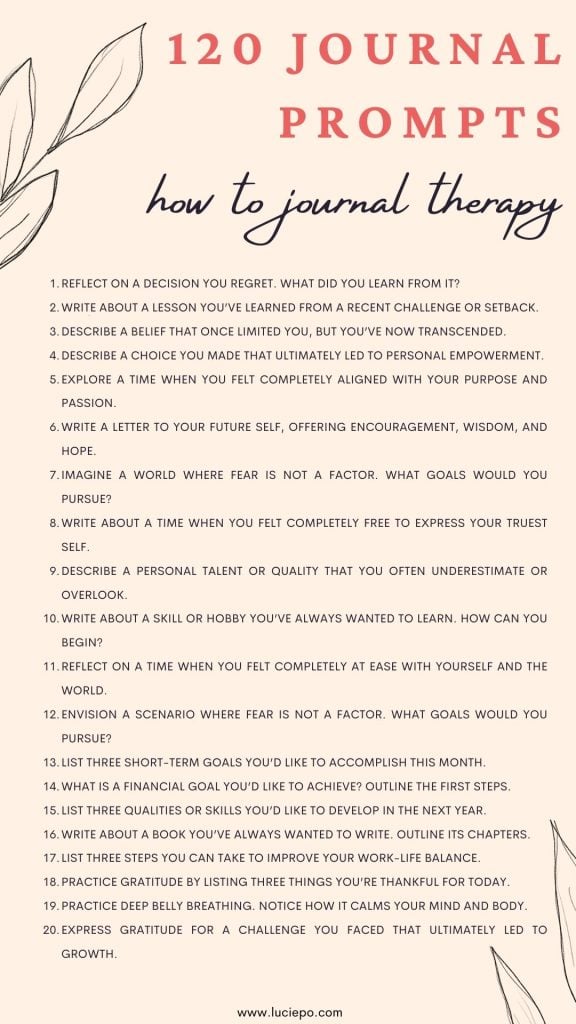
How To Journal Therapy: 120 Transformative Journal Therapy Prompts
Ever wondered how putting pen to paper can work wonders for your mental and emotional well-being? Well, you’re in for a treat! This article is all about the transformative magic of how to journal therapy and the incredible prompts that can kickstart your journey to self-discovery and personal growth.
We’re diving into the art of journaling with 120 prompts that cover a range of topics – from introspection to creativity to goal-setting and more. Whether you’re new to journaling or a seasoned pro, you’re bound to find something that resonates with you.
So, grab your favorite journal and a cozy corner, and let’s embark on this journey together. Get ready to unlock new insights, release pent-up emotions, and chart a course toward a happier, more fulfilled you.
Let’s dive in!

The Power of Journal Therapy
Picture this: a judgment-free zone where your thoughts flow freely, where emotions find their voice, and where dreams take shape on the page. This is the incredible power of journal therapy. It’s a journey of self-discovery, emotional healing, and personal growth all wrapped up in the pages of your trusted journal.
So what are the main benefits of journaling?
- Safe Space: Journaling creates a safe, judgment-free zone for your thoughts.
- Self-Discovery: Uncover hidden emotions and gain insights into yourself.
- Emotional Healing: Journal therapy serves as a tool for emotional release and healing.
- Setting Goals: Use journaling to set and track meaningful life goals.
- Clarity and Reflection: Gain clarity on life’s challenges and reflect on your experiences.
- Self-Compassion and Growth: Embrace self-compassion and experience personal growth through journaling.
Research suggests that regular journaling can lead to reduced stress levels, improved mood, and enhanced self-awareness. Additionally, studies have shown that journaling can be an effective tool in managing anxiety and depression.
DOWNLOAD FREE PDF WITH 120 JOURNAL PROMPTS HERE
Getting Started with Journal Therapy
Beginning your journey in journal therapy is a powerful move towards understanding oneself and achieving emotional balance.
In this section, we’ll walk you through the fundamental steps to start journal therapy, equipping you with the tools and techniques for this transformative practice.
Choose Your Journal
Select a journal that resonates with you. It could be a beautiful notebook or a digital journaling app – whatever feels right.
- Consider Your Preference:
- Decide between a physical journal or a digital platform based on what feels most comfortable and accessible to you.
- Size and Format:
- Choose a size and format that suits your writing style. Options range from pocket-sized notebooks to larger, more elaborate journals.
- Paper Quality:
- Opt for a quality paper that accommodates your writing instruments without bleeding or feathering.
- Binding and Cover:
- Select a binding (spiral-bound, stitched, etc.) and cover material (hardcover, softcover, leather, etc.) that resonates with you.
- Lined or Blank Pages:
- Decide whether you prefer lined pages for structured writing or blank pages for free-form expression.
- Additional Features:
- Some journals may include features like ribbon markers, pockets, or elastic closures. Consider if these are important to you.
- Reflect Your Style:
- Choose a journal that reflects your personal style, whether it’s minimalist, artistic, or elegant.
- Accessibility:
- Ensure your chosen journal is easily accessible for regular use, whether you carry it with you or keep it in a designated space.

Set a Time
Allocate a specific time for journaling each day. It could be in the morning to start your day with clarity or in the evening to reflect on your experiences.
- Morning or Evening:
- Decide whether you prefer to journal in the morning to set intentions for the day, or in the evening to reflect on the day’s events.
- Align with Your Energy Levels:
- Consider whether you’re more alert and focused in the morning or if you find reflection easier in the evening.
Create a Ritual
Establish a calming ritual before you begin. It could be sipping tea, lighting a candle, or simply taking a few deep breaths.
- Set the Atmosphere:
- Establish a calming environment by dimming lights, lighting candles, or playing soothing music.
- Mindful Preparation:
- Approach journaling with intention. Take a few moments to center yourself and clear your mind.
- Use Prompts or Themes:
- Have specific prompts or themes in mind to guide your journaling session.
- Begin with Gratitude:
- Start by expressing gratitude. This positive mindset can set the tone for a meaningful session.
Download my free Gratitude Jar Exercise HERE
- Reflect and Respond:
- Take time to reflect on your prompts and respond honestly and authentically.
- End with Affirmations or Intentions:
- Conclude your session by setting positive intentions or affirmations for the day ahead.
- Close with Mindfulness:
- End your ritual by taking a moment to breathe deeply and be present in the moment.
- Make it Personal:
- Tailor your ritual to suit your preferences and make it a meaningful part of your day.
Write Freely
There are no rules in journal therapy. Write whatever comes to mind, without judgment. This is your private space.
- No Judgment or Editing:
- Release the need for perfection. Write without worrying about grammar, spelling, or structure.
- Stream of Consciousness:
- Allow your thoughts to flow naturally, even if they seem disconnected or random.
- Embrace Vulnerability:
- Be open and honest with yourself. This is a safe space for your innermost thoughts and feelings.
- Explore Emotions:
- Dive deep into your emotions, even if they are complex or difficult to articulate.
- No Rules, Just Expression:
- There are no right or wrong ways to express yourself in your journal. Let it be a true reflection of you.
- Trust Your Instincts:
- Follow your intuition. Write about whatever comes to mind, even if it surprises you.
- Dig Deeper if Necessary:
- If a particular thought or emotion arises, don’t be afraid to explore it further.
- Find Your Flow:
- Allow your writing to guide you. It may lead you to unexpected insights or revelations.
Explore Prompts
Experiment with different prompts to kickstart your journaling journey. Reflective, expressive, goal-oriented – there are endless possibilities.
- Choose Diverse Topics:
- Select prompts that cover a wide range of subjects, from self-reflection to future aspirations.
- Reflect on Your Emotions:
- Use prompts that encourage you to explore and understand your feelings.
- Consider Visual Prompts:
- Include images or photographs that inspire your journal entries.
- Incorporate Quotes or Passages:
- Use meaningful quotes or excerpts from books as prompts for reflection.
- Personalize Your Prompts:
- Tailor prompts to suit your unique experiences, goals, and interests.
- Experiment with Different Styles:
- Try prompts that encourage poetry, storytelling, or even letter-writing.
- Revisit Previous Entries:
- Use past journal entries as prompts for further reflection or to track your progress.
- Allow Room for Spontaneity:
- Sometimes, the most powerful prompts arise from your immediate surroundings or thoughts.
Consistency is Key
Aim for regularity, but don’t stress about it. It’s about progress, not perfection
- Start Small, Build Up:
- Begin with manageable sessions and gradually increase the duration as it becomes a habit.
- Prioritize Commitment:
- Treat your journaling practice as an important appointment with yourself.
- Adapt to Your Needs:
- Be flexible with your routine, adjusting it to suit different phases or circumstances in your life.
- Track Your Progress:
- Note how consistency positively impacts your well-being and personal growth.
- Acknowledge Resistance:
- Understand that there may be days when journaling feels challenging. Push through, as these are often the most transformative moments.
- Celebrate Milestones:
- Recognize and celebrate your commitment to journaling, no matter how small.
- Embrace Imperfection:
- Remember that consistency is about progress, not perfection. Allow yourself room to grow.
Embrace Imperfection
Don’t worry about grammar or spelling. This is for you, and there’s no need to edit.
- Let Go of Perfectionism:
- Release the need for flawless entries. Your journal is a space for authentic expression, not a polished document.
- Accept Unfinished Thoughts:
- It’s okay to leave sentences incomplete or ideas unresolved. Your journal is a reflection of your evolving thoughts.
- Value the Process Over the Product:
- Focus on the act of journaling itself, rather than on crafting a perfectly written entry.
- Celebrate Mistakes:
- Embrace errors, crossed-out words, and messy handwriting as symbols of your genuine self.
- Use Journaling as a Learning Tool:
- View imperfections as opportunities for growth and self-discovery.
- Be Kind to Yourself:
- Practice self-compassion. Treat your journal as a friend who accepts you exactly as you are.
- Let Your Voice Shine:
- Your unique perspective and way of expressing yourself are what make your journal special.
- See Imperfections as Beauty:
- Remember that the raw, unfiltered aspects of your journal are what make it a true reflection of you.
Reflect and Grow
Use journaling as a tool for self-reflection and personal growth. It’s a journey, and each entry is a step forward.
- Review Previous Entries:
- Take time to revisit past journal entries to track your progress and see how you’ve evolved.
- Acknowledge Achievements:
- Celebrate your accomplishments, no matter how small. Recognize your growth.
- Identify Areas for Improvement:
- Use your journal to pinpoint areas where you’d like to focus on personal development.
- Set New Intentions:
- Based on your reflections, establish fresh goals and intentions for the future.
- Learn from Challenges:
- Use your journal to gain insights from difficult experiences and find ways to overcome them.
- Express Gratitude for Growth:
- Take a moment to express gratitude for the progress you’ve made on your journey.
- Visualize Your Future Self:
- Use your journal as a canvas to imagine and plan for the person you want to become.
- Embrace Change:
- Welcome the natural evolution and transformation that comes with self-reflection and growth.

Types of Journal Therapy Prompts
Each type of prompt serves as a unique entry point into your inner world, allowing you to explore different facets of yourself and your experiences.
Reflective Prompts
- Encourage self-awareness and introspection.
- Examples: “What are my core values?” or “Describe a recent challenge and how I handled it.“
Expressive Prompts
- Foster emotional release and creative expression.
- Examples: “Write a letter to your younger self” or “Describe a moment of pure joy in detail.“
Goal-Oriented Prompts
- Assist in setting and achieving personal objectives.
- Examples: “List three short-term and three long-term goals” or “What steps can I take to achieve my dream job?“
Mindfulness Prompts
- Promote present-moment awareness and stress reduction.
- Examples: “Describe a simple pleasure you experienced today” or “What are five things you’re grateful for right now?“
Healing Prompts
- Aid in processing emotions and overcoming challenges.
- Examples: “Write a letter to someone who has hurt you (you don’t need to send it)” or “What is one thing you can forgive yourself for?“
120 Transformative Journal Therapy Prompts
Embarking on this journaling journey? Here’s a treasure trove of prompts to spark your self-discovery and personal growth:
Reflective Prompts
- Describe a time when you felt completely in tune with your intuition. What was the outcome?
- Reflect on a belief or perspective that has evolved over the years. How has it impacted you?
- Write about a personal strength you didn’t realize you had until a challenging situation arose.
- Explore a dream or aspiration you’ve put on hold. What steps can you take to reignite it?
- Reflect on a moment when you made a significant change in your life. What motivated this change?
- Write about a time when you felt truly at peace with yourself and the world around you.
- Describe a core value that guides your decisions. How does it shape your actions?
- Reflect on a decision you regret. What did you learn from it?
- Write about a lesson you’ve learned from a recent challenge or setback.
- Explore a recurring thought or pattern in your life. What does it reveal about you?
- Reflect on a time when you felt a deep sense of gratitude. What brought about this feeling?
- Write about a turning point in your life that led to personal growth and transformation.
- Describe a belief that once limited you, but you’ve now transcended.
- Reflect on a significant achievement in your life. What qualities or actions contributed to it?
- Write about a goal or dream that feels aligned with your truest self. What can you do to pursue it?
- Explore a memory that still holds valuable insights or lessons for you today.
- Reflect on a moment of self-discovery that shifted your perspective on life.
- Write about a time when you experienced a profound sense of connection with another person.
- Describe a choice you made that ultimately led to personal empowerment.
- Reflect on a moment when you overcame self-doubt or fear. What gave you the strength to do so?
- Write about a value or principle that you hold dear. How does it guide your actions?
- Explore a time when you felt completely aligned with your purpose and passion.
- Reflect on a situation where vulnerability led to a deeper, more authentic connection.
- Write about a lesson you’ve learned from a mentor, friend, or family member who has stayed with you.
Expressive Prompts
- Write a letter to your future self, offering encouragement, wisdom, and hope.
- Describe a piece of art, music, or literature that deeply resonates with you. What draws you to it?
- Imagine a world where fear is not a factor. What goals would you pursue?
- Create a dialogue between your present self and the person you aspire to become.
- Write about a time when you felt completely free to express your truest self.
- Describe an imaginary place of comfort and solace. What does it look, smell, and feel like?
- Reflect on a book or movie that left a profound impact on your life. What did you take away from it?
- Write a letter to your inner critic, acknowledging its voice but asserting your own worthiness.
- Describe a personal talent or quality that you often underestimate or overlook.
- Explore a fictional character you deeply admire. What qualities resonate with you?
- Write about a skill or hobby you’ve always wanted to learn. How can you begin?
- Describe a moment when you felt completely in your element, doing what you love.
- Reflect on a time when you were filled with a sense of awe and wonder. What inspired it?
- Write a letter to a younger version of yourself, offering love, advice, and encouragement.
- Describe an alternate reality where you’re living your dream life. What does it entail?
- Reflect on a moment when you experienced a profound sense of beauty or harmony.
- Write about a creative project or endeavor you’ve always wanted to pursue. What’s stopping you?
- Imagine a conversation with a person who deeply understands and supports you. What do you discuss?
- Describe a piece of wisdom or advice that has profoundly influenced your journey.
- Reflect on a time when you felt completely at ease with yourself and the world.
- Write about a cherished memory from your childhood. What emotions and sensations come to mind?
- Describe an experience that made you question or reevaluate your beliefs. What did you discover?
- Write a letter to a friend or loved one, expressing gratitude for their presence in your life.
- Reflect on a time when you experienced a profound sense of connection with the natural world.

Goal-Oriented Prompts
- List three skills or talents you’d like to cultivate to enhance your personal and professional life.
- Envision a scenario where fear is not a factor. What goals would you pursue?
- Reflect on a dream project or endeavor. What steps can you take to bring it closer to reality?
- Write about a cause or issue you’re passionate about. How can you contribute to its progress?
- Set a goal to practice self-compassion every day this week. What specific actions will you take?
- List three short-term goals you’d like to accomplish this month.
- Visualize your ideal career. What steps can you take today to get closer?
- Write down a skill or hobby you’ve always wanted to learn. How can you start?
- What is a financial goal you’d like to achieve? Outline the first steps.
- Set a self-care goal for yourself this week. How will you accomplish it?
- List three habits or behaviors you’d like to cultivate to enhance your well-being.
- Outline a step-by-step plan for achieving a personal or professional milestone.
- Identify a long-term goal that aligns with your passions and values. What’s your first move?
- List three qualities or skills you’d like to develop in the next year.
- Write about a book you’ve always wanted to write. Outline its chapters.
- What is an environmental or social cause you’re passionate about? How can you contribute?
- Reflect on a recent success and consider what future achievements you’d like to pursue.
- Set a goal to foster deeper connections with loved ones. How will you do this?
- List three steps you can take to improve your work-life balance.
- Define a career aspiration that excites and motivates you. What’s the initial action?
- Write about a project or endeavor that aligns with your life’s purpose. What’s the first step?
- Identify an area in your life where you’d like to cultivate more discipline. How will you do it?
- Set a goal to explore a new hobby or interest this month. What steps will you take?
- Reflect on a goal you’ve achieved in the past. What strategies were most effective for you?
Mindfulness Prompts
- Close your eyes and take a deep breath. Describe the sensations you experience.
- Take a mindful walk. Pay attention to the sounds, smells, and textures around you.
- Sit in a comfortable position and focus on your breath. Observe its rhythm and flow.
- Bring your awareness to the present moment. What can you see, hear, and feel right now?
- Reflect on a recent challenge. How can you approach it with a sense of mindfulness?
- Practice gratitude by listing three things you’re thankful for today.
- Set aside a few minutes for silent meditation. What thoughts arise and how do they pass?
- Choose an object in your environment. Study it closely, noticing its details and textures.
- Spend a moment observing nature. What can you learn from its rhythm and cycles?
- Reflect on a past experience without judgment. What lessons can you draw from it?
- Engage in a mindful eating exercise. Savor each bite and pay attention to flavors and textures.
- Take a few moments to express self-compassion. What kind words can you offer yourself?
- Close your eyes and focus on the sounds around you. What do they evoke in you?
- Reflect on a personal strength or quality. How does it contribute to your well-being?
- Practice deep belly breathing. Notice how it calms your mind and body.
- Set an intention for the day ahead. How can you infuse it with mindfulness?
- Observe the way your body feels at this moment. Are there areas of tension or relaxation?
- Reflect on a current worry. Can you reframe it with a sense of acceptance and perspective?
- Choose a piece of music and let it wash over you. How does it influence your mood?
- Spend a few minutes in stillness. What thoughts or sensations arise in this quiet space?
- Reflect on a moment of stillness or serenity in your day. How can you cultivate more of it?
- Engage in a body scan meditation. What sensations do you notice in different areas?
- Write down a positive affirmation and repeat it to yourself. How does it make you feel?
- Reflect on a person or situation with forgiveness and compassion. How does it shift your perspective?
DOWNLOAD FREE PDF WITH 120 PROMPTS HERE
Healing Prompts
- Write a letter to your past self during a difficult period, offering love and support.
- Reflect on a time when you forgave someone and how it impacted your own healing.
- Describe a strength or quality you admire in yourself and why it’s important.
- Express gratitude for a challenge you faced that ultimately led to growth.
- Describe a moment when you felt truly seen and accepted by another person.
- Write a letter to someone who has deeply influenced your life, even if indirectly.
- Reflect on a time when you felt a sense of release or relief after sharing your emotions.
- Write about a piece of advice or wisdom that has provided solace in challenging times.
- Describe a place or environment where you feel completely at peace and rejuvenated.
- Reflect on a creative outlet or activity that brings you a sense of inner calm and healing.
- Write about a moment of self-discovery that marked a turning point in your healing journey.
- Describe a practice or ritual that you find soothing and restorative for your soul.
- Reflect on a time when you showed kindness to yourself during a moment of struggle.
- Write a letter to your future self, imagining a healed and thriving version of you.
- Describe a person or relationship that has been a source of support and healing for you.
- Reflect on a book, quote, or poem that has provided comfort and solace in tough times.
- Write about a lesson you learned through adversity that has become a source of strength.
- Describe a creative expression or form of art that helps you process and heal emotions.
- Reflect on a moment when you felt a profound sense of self-compassion and self-love.
- Write a letter to a loved one who has passed away, expressing your feelings and memories.
- Describe a practice of self-care that brings you a deep sense of nourishment and renewal.
- Reflect on a time when you embraced vulnerability and found strength in doing so.
- Write about a place in nature that holds special meaning and provides a sense of healing.
- Describe a dream or vision you have for your healed and thriving future self.

Additional Journaling Resources
Embarking on a journaling journey is a deeply personal experience, and having the right tools and guidance can enhance its impact.
Explore the following resources to find journals, prompts, and apps that align with your unique journaling style and preferences.
Books for Deeper Insight
- The Artist’s Way by Julia Cameron – A timeless guide to unlocking creativity through journaling.
- Writing Down the Bones by Natalie Goldberg – Offers practical advice and encouragement for aspiring writers.
- The Gifts of Imperfection by Brené Brown – Explores the power of vulnerability and self-compassion, complementing journal therapy.
Journaling Apps to Streamline Your Practice
- Day One – A sleek and intuitive digital journal app with features like photo integration and mood tracking.
- Journey – Allows for multi-platform access and secure cloud syncing, making journaling on-the-go a breeze.
- Reflectly – An AI-driven journaling app that prompts self-reflection and tracks mood patterns.
Websites and Communities for Inspiration
- The Center for Journal Therapy – Offers articles, courses, and resources for deepening your journaling practice.
- r/Journaling – A vibrant online community where individuals share tips, prompts, and experiences related to journaling.
- FB Groups – Connect with a supportive community of fellow journaling enthusiasts for inspiration, discussions, and shared experiences.
Frequently Asked Questions
What is journal therapy?
Journal therapy is a form of expressive writing that encourages self-reflection, emotional processing, and personal growth. It’s a safe space to explore thoughts, feelings, and experiences.
Do I need to be a skilled writer to start journaling?
Not at all! Journaling is about expressing yourself, not perfecting prose. It’s for everyone, regardless of writing ability.
How often should I journal?
There’s no one-size-fits-all answer. It’s about what feels right for you. Some journal daily, while others do it weekly or as needed.
What if I don’t know what to write about?
That’s completely normal! Try using prompts, reflecting on your day, or simply writing about what’s on your mind at that moment.
Can I use digital platforms for journal therapy?
Absolutely! Many people find digital journaling just as effective. It’s about finding what works best for you.
What if I uncover difficult emotions during journaling?
It’s okay to feel challenged. Take it at your own pace. If you’re struggling, consider seeking support from a therapist or counselor.
How can I make journaling a habit?
Start small, set reminders, and choose a time that works for you. Remember, consistency is more important than quantity.
Is journal therapy a substitute for professional therapy?
While journal therapy can be incredibly beneficial, it’s not a replacement for professional mental health support when needed. Always seek help if you’re struggling.
Can children and teens benefit from journal therapy?
Absolutely. Journaling can be a powerful tool for young people to process emotions, gain self-awareness, and develop healthy coping mechanisms.
What if I want to keep my journal private?
That’s completely up to you! Many people find great comfort in knowing their thoughts are for their eyes only. It’s your space to be completely authentic.
Why journaling is therapeutic?
Journaling provides a safe, private space to express emotions, thoughts, and experiences. It encourages self-reflection, fosters emotional processing, and promotes self-awareness, leading to a sense of relief and clarity.
How to write in a journal for therapy?
Begin by finding a quiet, comfortable space. Set a clear intention for your session, whether it’s self-reflection, problem-solving, or emotional release. Write freely, without worrying about grammar or structure. Let your thoughts flow naturally.
What is journal therapy?
Journal therapy is a form of expressive writing that encourages self-exploration and emotional healing. It involves using journaling as a tool for self-discovery, self-reflection, and personal growth.
How to journal to release emotions?
To use journaling as a tool to release emotions, start by acknowledging and identifying what you’re feeling. Write freely and honestly about these emotions. Allow yourself to express without judgment. You may also consider using prompts or visual aids to facilitate the process.
Resources
Deaver, S. P., & McAuliffe, G. (2009, October 26). Reflective visual journaling during art therapy and counselling internships: a qualitative study. Reflective Practice, 10(5), 615–632. https://doi.org/10.1080/14623940903290687
Gibson, D. (2018, April 3). A Visual Conversation With Trauma: Visual Journaling in Art Therapy to Combat Vicarious Trauma. Art Therapy, 35(2), 99–103. https://doi.org/10.1080/07421656.2018.1483166
Connolly Baker, K., & Mazza, N. (2004, September). The healing power of writing: applying the expressive/creative component of poetry therapy. Journal of Poetry Therapy, 17(3), 141–154. https://doi.org/10.1080/08893670412331311352
Utley, A., & Garza, Y. (2011, March 18). The Therapeutic Use of Journaling With Adolescents. Journal of Creativity in Mental Health, 6(1), 29–41. https://doi.org/10.1080/15401383.2011.557312
Miller, W. (2014, January 1). Interactive Journaling as a Clinical Tool. Journal of Mental Health Counseling, 36(1), 31–42. https://doi.org/10.17744/mehc.36.1.0k5v52l12540w218





